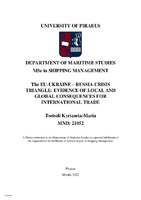| dc.contributor.advisor | Polemis, Dionisios | |
| dc.contributor.advisor | Πολέμης, Διονύσιος | |
| dc.contributor.author | Τσέτσελη, Κυριαζέτα - Μαρία | |
| dc.contributor.author | Tsetseli, Kyriazeta - Maria | |
| dc.date.accessioned | 2023-06-20T09:47:28Z | |
| dc.date.available | 2023-06-20T09:47:28Z | |
| dc.date.issued | 2022 | |
| dc.identifier.uri | https://dione.lib.unipi.gr/xmlui/handle/unipi/15514 | |
| dc.identifier.uri | http://dx.doi.org/10.26267/unipi_dione/2936 | |
| dc.description.abstract | Μετά τη Ρωσία, η Ουκρανία είναι η δεύτερη μεγαλύτερη χώρα στην Ευρώπη. Ιστορικά, η Ουκρανία
ήταν ένα σημαντικό μέρος των εδαφών που κατοικούσαν οι Ρώσοι (πρόγονοι του σύγχρονου
Ρώσοι), μέχρι την εισβολή της Μογγολικής Αυτοκρατορίας τον 13ο αιώνα. Μέχρι το
αρχές του 20ου αιώνα, σημειώθηκαν διάφορες αναταραχές. Αν και η Ουκρανία ήταν
ανεξάρτητη χώρα από το 1918 έως το 1920, ήταν ως τότε μέρος της Σοβιετικής Ένωσης μέχρι
την κατάρρευση της τελευταίας το 1991, όταν έγινε πλήρως πολιτικά ανεξάρτητη.
Ωστόσο, η ουκρανική ανεξαρτησία δεν έτυχε ποτέ θετικής υποδοχής στη Ρωσία. Στην πραγματικότητα,
οι Ρώσοι, λόγω της ιστορίας των εισβολών, από τους Μογγόλους έως τους Ναζί Γερμανούς,
θεωρούσαν την Ουκρανία, όπως και άλλες γειτονικές χώρες, κάτι σαν τους «προμαχώνες» τους.
Η επέκταση του ΝΑΤΟ κατά τις δεκαετίες του 1990 και του 2000, με τη συμπερίληψη χωρών
όπως η Πολωνία, η Λιθουανία, η Λετονία και η Εσθονία, κάνει τους Ρώσους να πιστεύουν ότι τους
καταπατείται ζωτικός χώρος. Και αυτό γιατί πιστεύουν ότι οι ΗΠΑ είναι
πίσω από αυτό, που έχει εισβάλει σε ξένες χώρες τουλάχιστον δύο φορές τα τελευταία είκοσι χρόνια:
στο Αφγανιστάν και στο Ιράκ. | el |
| dc.format.extent | 68 | el |
| dc.language.iso | en | el |
| dc.publisher | Πανεπιστήμιο Πειραιώς | el |
| dc.rights | Αναφορά Δημιουργού-Όχι Παράγωγα Έργα 3.0 Ελλάδα | * |
| dc.rights | Αναφορά Δημιουργού-Μη Εμπορική Χρήση-Όχι Παράγωγα Έργα 3.0 Ελλάδα | * |
| dc.rights.uri | http://creativecommons.org/licenses/by-nc-nd/3.0/gr/ | * |
| dc.title | The EU-Ukraine-Russia crisis triangle : evidence of local and global consequences for international trade | el |
| dc.title.alternative | Το τρίγωνο κρίσης ΕΕ-Ουκρανίας-Ρωσίας : στοιχεία τοπικών και παγκόσμιων συνεπειών για το διεθνές εμπόριο | el |
| dc.type | Master Thesis | el |
| dc.contributor.department | Σχολή Ναυτιλίας και Βιομηχανίας. Τμήμα Ναυτιλιακών Σπουδών | el |
| dc.description.abstractEN | After Russia, Ukraine is the second largest country in Europe. Historically, Ukraine
was a major part of the territories inhabited by the Rus (ancestors of modern
Russians), until the invasion of the Mongol Empire in the 13th century. Until the
beginning of the 20th century, various disturbances occurred. Although Ukraine was
an independent country from 1918 to 1920, it was then part of the Soviet Union until
the latter's collapse in 1991, when it became fully politically independent.
However, Ukrainian independence was never well received in Russia. In fact, the
Russians, due to the history of invasions, from the Mongols to the Nazi Germans,
consider Ukraine, like other neighboring countries, something like their "bastions".
The expansion of NATO during the 1990s and 2000s, with the inclusion of countries
such as Poland, Lithuania, Latvia and Estonia, makes the Russians believe that their
vital space is being encroached upon. And this is because they believe that the USA is
behind it, which has invaded foreign countries at least twice in the last twenty years:
in Afghanistan and Iraq. | en |
| dc.contributor.master | Shipping Management | el |
| dc.subject.keyword | Crisis | el |
| dc.subject.keyword | Conflicts | el |
| dc.subject.keyword | Ukraine | el |
| dc.subject.keyword | Russia | el |
| dc.subject.keyword | Trade | el |
| dc.date.defense | 2023-05-17 | |



